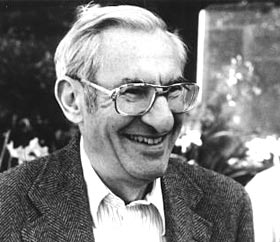UC Berkeley Press Release
Mathematician Murray Protter has died at 90
BERKELEY – Murray H. Protter, a former chair of the mathematics department at the University of California, Berkeley, whose calculus textbook sold more than a million copies in the 1960s and '70s, died May 1 at his home in Berkeley of congestive heart failure. He was 90.
 Murray Protter (George Bergman/UC Berkeley photo) |
Protter, a professor emeritus of mathematics, specialized in an area of calculus called partial differential equations, which deals with the solutions of complex equations involving several variables. Such equations describe key physical processes such as heat and fluid flow.
In 1964, Protter coauthored with fellow UC Berkeley mathematician Charles B. Morrey Jr. the book "Calculus with Analytic Geometry: A First Course." It became the second best-selling calculus text at the time in the United States, according to his son, Philip Protter, now a professor of operations research at Cornell University. The textbook, last published in 1988, helped train a generation of engineers, scientists and mathematicians.
While Protter was known internationally for his research involving maximum principles and partial differential equations, he had perhaps his greatest impact on mathematics education and on the reputation of UC Berkeley's Department of Mathematics. He was chair of the department between 1962 and 1965, not long after the 1957 launch of the Sputnik satellite by the Soviet Union. Improved science and mathematics education immediately became a national priority to maintain U.S. competitiveness, and Protter helped hire many of the great mathematicians of the day, turning UC Berkeley into one of the best mathematics departments in the country and the world.
"Murray built on the achievements of previous chairs in very significant ways to establish UC Berkeley's mathematics department as the leading program in the nation," said professor and former mathematics chair Calvin C. Moore, who wrote a history of the department.
One of Protter's innovations was self-paced learning, which he started in the math department in 1972 to allow students to advance in calculus at their own pace through self-study, said current mathematics chair Alan Weinstein.
"Students were enthusiastic about this form of instruction," Protter wrote in a 1991 article in the journal The American Mathematical Monthly, and self-paced enrollment jumped from an initial 85 students in 1972 to 500 students two years later. Self-paced calculus lasted some 20 years, with one-third of all calculus students taking it at one point, before it was phased out within the math department.
While at UC Berkeley, Protter also was chosen to lead a delegation of mathematicians to the Soviet Union as part of a cultural exchange during that nation's brief period of détente.
Protter's expertise was also sought by industry. Shell Oil Company consulted Protter about its failure to find oil where its seismic surveys and mathematical equations had predicted it would be. Protter pointed out that the company was using partial differential equations that had no solutions, and provided the correct formulation of the equation.
Protter was born Feb. 13, 1918, and grew up in Brooklyn, N.Y. He graduated from the University of Michigan in 1937 and earned his Ph.D. at Brown University in 1946.
While pursuing his Ph.D., he joined the Second World War effort as a physicist in Washington, D.C., and then from 1943 to 1945 at the C. Vaught Aircraft company in Stratford, Conn. At the latter, he calculated the flutter speed of military aircraft, that is, the speed at which an airplane's wings begin to vibrate violently - sometimes so violently that the wings fall off. At the time, this was a recurring problem in airplane design. His calculations allowed the company to make the flutter speed faster than the airplane was designed to fly.
From 1947 to 1951, Protter was an assistant professor at Syracuse University, then moved to the Institute for Advanced Study in Princeton, N.J., until 1953, when he joined the UC Berkeley faculty. He retired in 1988, when he received UC Berkeley's highest honor, the Berkeley Citation.
Protter was recalled from retirement between 1990 and 1992 when F. Alberto Grunbaum agreed to take over as chair of the Department of Mathematics, but only if Protter served as deputy chairman.
"When I was appointed as chair, I was too aware of my own limitations and decided that I could only take the job if Murray was willing to assist me in a number of ways," said Grunbaum. "The department has lost someone of great integrity and sound judgment, and I have also lost a trusted friend."
Protter was active in the American Mathematical Society, serving for many years as its treasurer, and was a longtime editor of the book reviews of the Bulletin of the American Mathematical Society. Though he authored many books, the research book of which Protter was most proud was "Maximum Principles in Differential Equations," written jointly with Hans Weinberger and first published in 1967. It was re-issued by Springer-Verlag publishing company in 1999.
Protter was a Miller Research Professor in 1959 and again in 1967, and served as executive director of the Miller Institute for Basic Research in Science from 1981 to 1983.
Protter is survived by his wife, Ruth Rotman Protter, of Berkeley; daughter, Barbara Robison, of Overland Park, Kan.; and son, Philip, of Ithaca, N.Y. He also leaves four grandchildren and three great-grandchildren.
A campus memorial is planned for Sunday, Sept. 21, 1-4 p.m., at the UC Berkeley Faculty Club.

